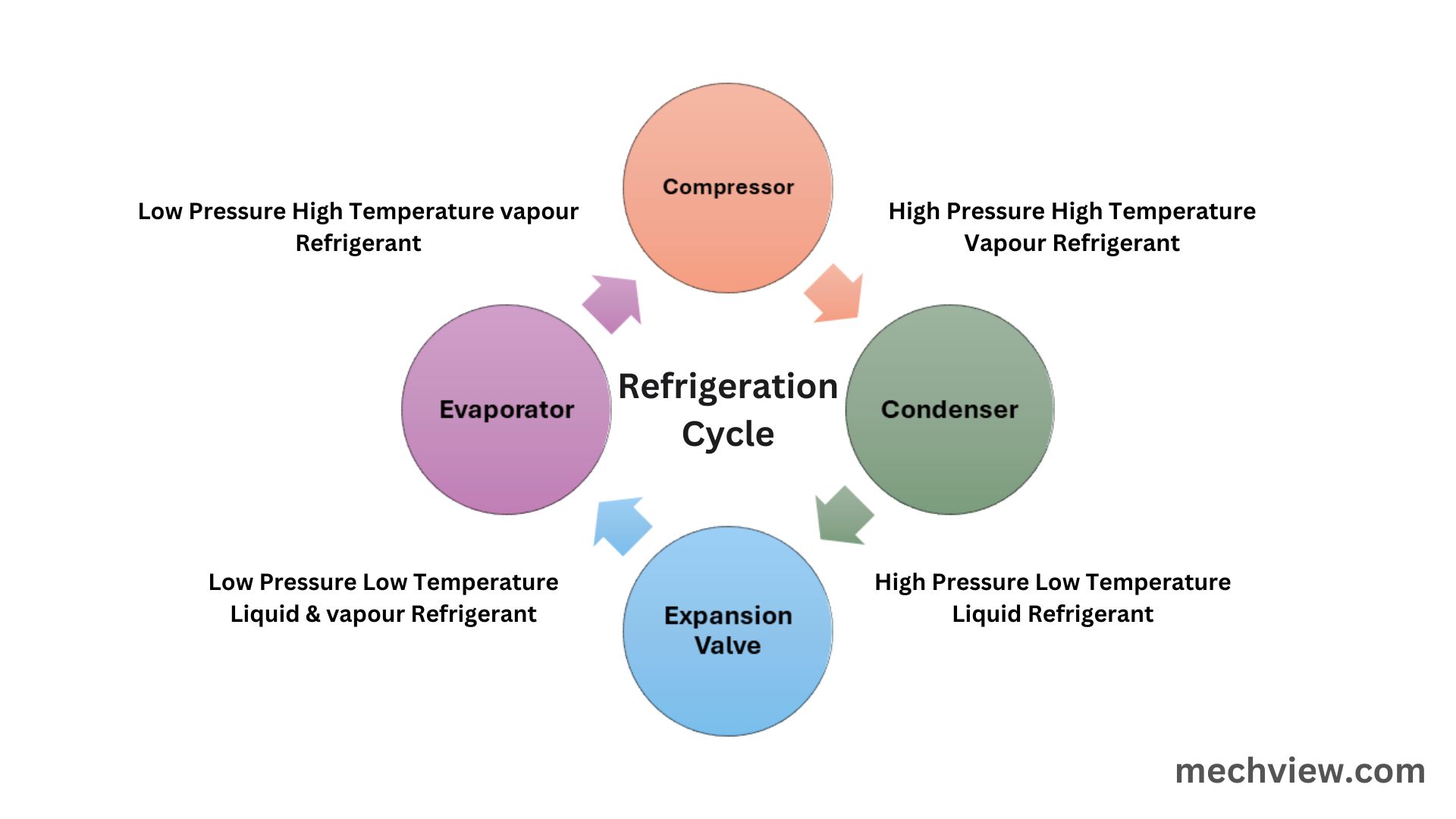Refrigeration
Refrigeration is a process of cooling a space, substance, or system to lower and maintain its temperature below the ambient temperature. This is typically achieved by transferring heat from the desired area to a cooler environment, using refrigerants and mechanical systems such as compressors and condensers. Refrigeration is widely used in various applications, including food preservation, air conditioning, and industrial processes, to maintain specific temperature levels for optimal functioning and comfort.
Refrigeration is a process of removing heat from an enclosed space or substance to lower its temperature, typically for preserving food, cooling liquids, or creating a comfortable environment.
Air conditioning
Air conditioning refers to a system or technology that controls and regulates the temperature, humidity, and air quality in indoor spaces to create a comfortable and healthy environment. It typically involves cooling the air in hot climates and may include heating functions in colder regions. Air conditioning systems are commonly used in residential, commercial, and industrial buildings, as well as in vehicles and aircraft, to maintain optimal comfort levels for occupants.
Principles of refrigeration
1. Refrigeration Cycle: The refrigeration process follows a cycle known as the vapor compression cycle. This cycle includes four main components: a compressor, a condenser, an expansion valve (or throttle valve), and an evaporator.
- Compressor: The compressor is responsible for compressing the refrigerant gas, increasing its pressure and temperature.
- Condenser: The high-pressure, high-temperature refrigerant gas flows into the condenser, where it releases heat to the surroundings and condenses into a liquid state.
- Expansion Valve: The liquid refrigerant then passes through the expansion valve, which reduces its pressure and temperature as it enters the evaporator.
- Evaporator: In the evaporator, the low-pressure, low-temperature liquid refrigerant absorbs heat from the space or substance being cooled, causing it to evaporate into a gas again.
2. Refrigerant: The refrigerant is a substance with properties that allow it to absorb and release heat efficiently during the refrigeration cycle. Common refrigerants include hydrofluorocarbons (HFCs), hydrochlorofluorocarbons (HCFCs), and natural refrigerants like ammonia, carbon dioxide, and hydrocarbons. The choice of refrigerant depends on factors such as environmental impact, efficiency, and safety.
3. Heat Transfer: Refrigeration systems transfer heat from the desired space or substance (known as the refrigerated space or load) to the surroundings. This heat transfer occurs through the circulation of the refrigerant between the various components of the refrigeration system and the interaction with the surrounding air or water in the condenser and evaporator.

Importance of Refrigeration
Refrigeration plays a crucial role in various aspects of modern life due to its numerous benefits and applications. Here are some points highlighting the importance of refrigeration:
1. Food Preservation: One of the primary uses of refrigeration is in preserving perishable food items. By maintaining low temperatures, refrigeration slows down the growth of bacteria, fungi, and other microorganisms that cause food spoilage. This helps extend the shelf life of food, reduces food waste, and ensures food safety for consumption.
2. Commercial and Industrial Applications: Refrigeration is essential in industries such as food processing, pharmaceuticals, and chemical manufacturing. It enables the storage and transport of temperature-sensitive products, preserves the quality of raw materials and finished goods, and supports various industrial processes that require controlled temperatures.
3. Comfort and Convenience: Refrigeration is integral to maintaining comfortable indoor environments in homes, offices, hospitals, and other buildings. Air conditioning systems use refrigeration principles to cool and dehumidify air, creating a more pleasant and healthy atmosphere for occupants, especially during hot and humid weather conditions.
4. Medical and Healthcare: Refrigeration plays a critical role in storing vaccines, medications, blood products, and biological samples in healthcare facilities. Proper refrigeration ensures the integrity and effectiveness of these items, preventing spoilage and maintaining their therapeutic properties.
5. Transportation and Logistics: Refrigerated trucks, containers, and warehouses are essential for transporting and storing perishable goods over long distances. This is vital for the global supply chain, ensuring that fresh produce, frozen foods, and temperature-sensitive products reach consumers in optimal condition.
“MechView: Unveiling Mechanical Engineering, Simply Explained!”
1 thought on “Refrigeration| Principles of Refrigeration and Importance of Refrigeration”